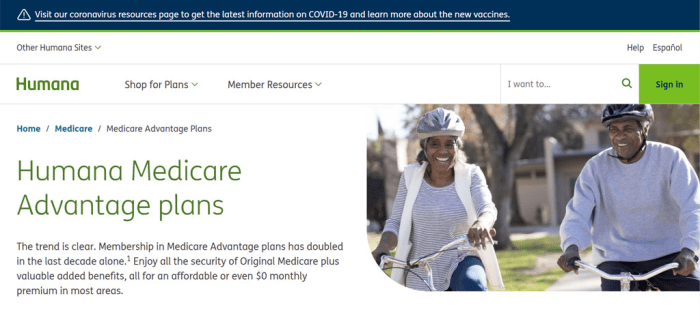Humana Medicare stands as a leading provider of healthcare plans designed specifically for individuals eligible for Medicare benefits. Navigating the complexities of Medicare can be daunting, but Humana offers a diverse range of options tailored to meet individual needs and preferences. From Medicare Advantage plans that provide comprehensive coverage to Medicare Supplement plans that enhance original Medicare benefits, Humana aims to empower individuals with choices that prioritize their health and well-being.
Table of Contents
This guide delves into the world of Humana Medicare, providing an in-depth look at its history, plan types, key features, eligibility requirements, and cost considerations. We’ll also explore Humana’s network of healthcare providers, customer support channels, and resources to help you make informed decisions about your Medicare coverage.
Medicare Supplement Plans: Humana Medicare

Medicare Supplement Plans, also known as Medigap plans, are insurance policies sold by private companies that help cover some of the out-of-pocket costs associated with Original Medicare (Part A and Part B). They are designed to fill in the gaps in coverage left by Original Medicare.
Types of Humana Medicare Supplement Plans
Humana offers a variety of Medicare Supplement plans, each with different coverage levels and premiums. Here is a breakdown of the different types of Humana Medicare Supplement plans:
- Plan A: This is the most basic Medicare Supplement plan. It covers the Medicare Part A coinsurance and hospital deductible, and the Medicare Part B coinsurance and deductible. Plan A also covers the blood deductible.
- Plan B: Plan B covers everything that Plan A covers, plus it covers the Medicare Part B excess charges. Excess charges are the difference between the Medicare-approved amount and the amount a doctor or other healthcare provider can charge.
- Plan C: Plan C covers everything that Plan B covers, plus it covers the Part A and Part B deductibles.
- Plan D: Plan D covers everything that Plan C covers, plus it covers the Part A and Part B coinsurance.
- Plan F: Plan F covers everything that Plan D covers, plus it covers the Part A and Part B coinsurance. It also covers the Part B excess charges.
- Plan G: Plan G covers everything that Plan F covers, except for the Part B deductible.
- Plan K: Plan K has a high deductible and covers everything that Plan F covers, except for the Part A and Part B deductibles. Plan K has a maximum out-of-pocket limit.
- Plan L: Plan L has a high deductible and covers everything that Plan G covers, except for the Part A and Part B deductibles. Plan L has a maximum out-of-pocket limit.
- Plan M: Plan M has a high deductible and covers everything that Plan N covers, except for the Part A and Part B deductibles. Plan M has a maximum out-of-pocket limit.
- Plan N: Plan N has a high deductible and covers everything that Plan G covers, except for the Part A and Part B deductibles. Plan N has a maximum out-of-pocket limit.
Coverage and Costs of Humana Medicare Supplement Plans
The coverage and costs of Humana Medicare Supplement plans vary depending on the plan you choose and your individual circumstances. Here are some factors that can affect the cost of your Medicare Supplement plan:
- Age: Generally, older people pay higher premiums for Medicare Supplement plans.
- Health: People with pre-existing health conditions may pay higher premiums.
- Location: Premiums can vary by state and county.
- Plan type: Plans with more comprehensive coverage generally have higher premiums.
Comparing Humana Medicare Supplement Plans
When comparing Humana Medicare Supplement plans, it’s important to consider your individual needs and budget. Here are some factors to keep in mind:
- Coverage: What types of costs do you want your plan to cover?
- Premiums: How much can you afford to pay in monthly premiums?
- Out-of-pocket costs: What are the potential out-of-pocket costs you could incur?
- Maximum out-of-pocket limit: This is the maximum amount you will have to pay out-of-pocket for covered medical expenses in a given year.
Medicare Resources and Information

Navigating the Medicare system can be complex, but there are valuable resources available to help you understand your coverage and make informed decisions.
Medicare.gov
Medicare.gov is the official website for the Centers for Medicare & Medicaid Services (CMS). It provides comprehensive information about Medicare, including eligibility requirements, benefits, costs, and enrollment options. You can access detailed information about different Medicare plans, find local providers, and learn about important updates and changes.
Additional Resources
Here are some additional resources that can provide valuable information about Medicare:
- The Medicare Rights Center: This non-profit organization offers free legal assistance and information to Medicare beneficiaries. They can help you understand your rights and options, and advocate for you if you have a problem with your Medicare coverage.
- The National Council on Aging (NCOA): The NCOA offers a variety of resources for older adults, including information about Medicare. Their website provides helpful articles, tools, and calculators to help you make informed decisions about your Medicare coverage.
- State Health Insurance Assistance Programs (SHIPs): SHIPs are state-based programs that offer free counseling and assistance to Medicare beneficiaries. They can help you understand your Medicare options and choose the plan that best meets your needs.
Tips for Navigating Medicare
Here are some tips for navigating the Medicare system and understanding your benefits:
- Start planning early: Medicare enrollment periods can be confusing. It’s important to start planning early and gather all the necessary information, such as your Social Security number, medical history, and contact information for your doctors.
- Review your Medicare Summary Notice (MSN): Your MSN is a monthly statement that summarizes your Medicare claims and payments. It’s a valuable tool for tracking your coverage and identifying any errors or discrepancies.
- Don’t be afraid to ask for help: If you’re unsure about anything, don’t hesitate to contact Medicare.gov, a SHIP, or other reputable resources for assistance.
Ultimately, choosing the right Humana Medicare plan involves careful consideration of your individual healthcare needs, budget, and preferences. By understanding the various plan options, their benefits, and limitations, you can make a well-informed decision that ensures access to quality healthcare and financial peace of mind. Remember, Humana offers a range of resources and support to guide you through the process, ensuring you have the information you need to make the best choice for your health journey.
Humana Medicare offers a range of plans designed to meet different needs and budgets. If you’re looking for personalized advice and support, consider connecting with a local Humana agent. You can find a Humana agent near you by visiting humana agents near me. They can help you understand your options and choose the right plan for your health and financial situation.


